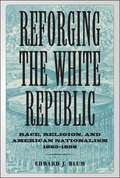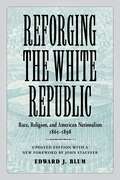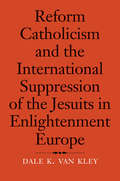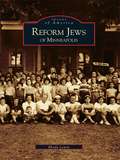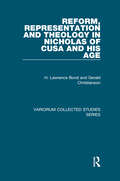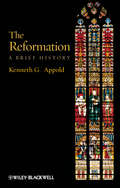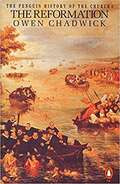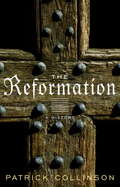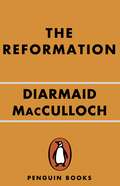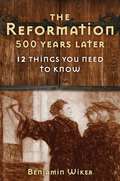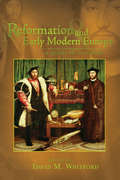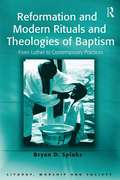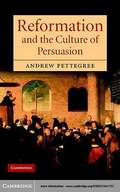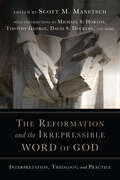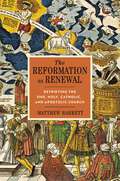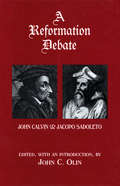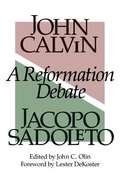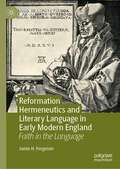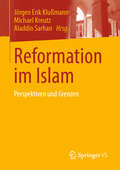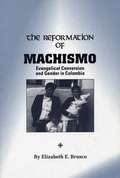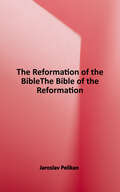- Table View
- List View
Reforging the White Republic
by Edward J. BlumDuring Reconstruction, former abolitionists in the North had a golden opportunity to pursue true racial justice and permanent reform in America. But why, after the sacrifice made by thousands of Civil War patriots to arrive at this juncture, did the moment slip away, leaving many whites throughout the North and South more racist than before? Edward J. Blum takes a fresh look at this question in Reforging the White Republic: Race, Religion, and American Nationalism, 1865-1898, where he focuses on the vital role that religion played in reunifying northern and southern whites into a racially segregated society. He tells the fascinating story of how northern Protestantism, once the catalyst for racial egalitarianism, promoted the image of a "white republic" that conflated whiteness, godliness, and nationalism. A blend of history and social science, Reforging the White Republic offers a surprising perspective on the forces of religion as well as nationalism and imperialism at a critical point in American history.
Reforging the White Republic: Race, Religion, and American Nationalism, 1865--1898 (Conflicting Worlds: New Dimensions of the American Civil War)
by John Stauffer Edward J. BlumDuring Reconstruction, former abolitionists in the North had a golden opportunity to pursue true racial justice and permanent reform in America. But after the sacrifice made by thousands of Union soldiers to arrive at this juncture, the moment soon slipped away, leaving many whites throughout the North and South more racist than before. Edward J. Blum takes a fresh look at the reasons for this failure in Reforging the White Republic, focusing on the vital role that religion played in reunifying northern and southern whites into a racially segregated society. A blend of history and social science, Reforging the White Republic offers a surprising perspective on the forces of religion as well as nationalism and imperialism at a critical point in American history.
Reform and Reformation: England 1509-1558
by G. R. EltonReform, not a dream but a rational prospect, had become the spirit of the Reformation England; it also provides the theme for this remarkable history of the reigns of Henry, Edward and Mary.
Reform Catholicism and the International Suppression of the Jesuits in Enlightenment Europe
by Dale K. Van KleyAn investigation into the role of Reform Catholicism in the international suppression of the Jesuits in 1773†‹ The Jesuits devoted themselves to preaching the word of God, administering the sacraments, and spreading the faith by missions in both Europe and newly discovered lands abroad. But, in 1773, under intense pressure from the monarchs of Europe, the papacy suppressed the Society of Jesus, an act that reverberated from Europe to the Americas and Southeast Asia. In this scholarly history, Dale Van Kley argues that Reform Catholicism, not a secular Enlightenment, provided the justification for Catholic kings to suppress a society instituted by the papacy. Spanning the years from the mid†‘sixteenth century to the onset of the French Revolution, and the Jesuit presence from China to Brazil, this is the only single volume in English to make coherent sense of the series of expulsions that add up to what was arguably the most important religious event in Europe of the time, resulting in the secularization of tens of thousands of Jesuits.
Reform Jews of Minneapolis (Images of America)
by Rhoda LewinThe German Jews who began coming to Minneapolis in the 1850s quickly entered society as doctors, lawyers, professors, merchants, and leaders in clothing and cigar manufacturing. In 1878 they founded Shaarai Tov, now Temple Israel--one of the ten largest Reform congregations in the U.S. today. They also enjoyed a busy social and cultural life, and both husbands and wives involved themselves in social service and welfare organizations. Including historic and present-day photographs and tales of the community--schools, synagogues, organizations, and outdoor activities--this collection uncovers the challenges and triumphs of Reform Jews in Minneapolis.
Reform, Representation and Theology in Nicholas of Cusa and His Age
by H. Lawrence Bond Gerald ChristiansonWhile most works on Nicholas of Cusa concentrate either on his early career as author of the monumental 'Catholic Concordance' or on his later career as writer of remarkable philosophical/theological works such as 'On Learned Ignorance' and 'The Vision of God', the essays included here attempt to address the whole Cusanus, sharing common contexts, issues and themes. Following chapters on the legacy of conciliarism and ecumenicity, the story begins with the Council of Basel for which Cusanus wrote 'The Catholic Concordance', but from which he broke away, raising issues of private conscience as well as the balance between papal authority and representative councils in the pursuit of reform. The story then turns to the 'matrix' between Constantinople and a new council in Ferrara when Cusanus received a ship-board gift from the 'Father of Lights' and began to write his great philosophical/theological treatises. When taken together the essays in this book not only form a cohesive whole, they also enlighten aspects often left in the shade, such as the enigmatic aspects of Cusanus' participation in the council, and his mystical theology that reveals a man of faith in search of certainty beyond the well-trod paths of philosophical reflection.
The Reformation: A Brief History (Wiley Blackwell Brief Histories of Religion #41)
by Kenneth G. AppoldThe Reformation: A Brief History is a succinct and engaging introduction to the origins and history of the Protestant Reformation. A rich overview of the Reformation, skillfully blending social, political, religious and theological dimensions A clearly and engagingly written narrative which draws on the latest and best scholarship Includes the history of the Reformation in Scandinavia and Eastern Europe, areas that are rarely covered in any detail The Reformation is placed in the context of the entire history of Christianity to draw out its origins, impetus, and legacy
The Reformation (The Penguin History of the Church #Volume 3)
by Owen ChadwickOwen Chadwick stands out as the trustsed authority on Reformation history. Not only is his scholorly knowledge outlined with enough precision to impress any aspiring historian, but Chadwick also manages to convey the facts with a level of underlying passion.
The Reformation
by Patrick Collinson“No revolution however drastic has ever involved a total repudiation of what came before it. ” The religious reformations of the sixteenth century were the crucible of modern Western civilization, profoundly reshaping the identity of Europe’s emerging nation-states. InThe Reformation, one of the preeminent historians of the period, Patrick Collinson, offers a concise yet thorough overview of the drastic ecumenical revolution of the late medieval and Renaissance eras. In looking at the sum effect of such disparate elements as the humanist philosophy of Desiderius Erasmus and the impact on civilization of movable-type printing and “vulgate” scriptures, or in defining the differences between the evangelical (Lutheran) and reformed (Calvinist) churches, Collinson makes clear how the battles for mens’ lives were often hatched in the battles for mens’ souls. Collinson also examines the interplay of spiritual and temporal matters in the spread of religious reform to all corners of Europe, and at how the Catholic Counter-Reformation used both coercion and institutional reform to retain its ecclesiastical control of Christendom. Powerful and remarkably well written,The Reformationis possibly the finest available introduction to this hugely important chapter in religious and political history. From the Hardcover edition.
The Reformation
by Diarmaid MaccullochThe Reformation and Counter-Reformation represented the greatest upheaval in Western society since the collapse of the Roman Empire a millennium before. The consequences of those shattering events are still felt today—from the stark divisions between (and within) Catholic and Protestant countries to the Protestant ideology that governs America, the world’s only remaining superpower.In this masterful history, Diarmaid MacCulloch conveys the drama, complexity, and continuing relevance of these events. He offers vivid portraits of the most significant individuals—Luther, Calvin, Zwingli, Loyola, Henry VIII, and a number of popes—but also conveys why their ideas were so powerful and how the Reformation affected everyday lives. The result is a landmark book that will be the standard work on the Reformation for years to come. The narrative verve of The Reformation as well as its provocative analysis of American culture’s debt to the period will ensure the book’s wide appeal among history readers.
The Reformation
by Diarmaid MaccullochThe Reformation and Counter-Reformation represented the greatest upheaval in Western society since the collapse of the Roman Empire a millennium before. The consequences of those shattering events are still felt today—from the stark divisions between (and within) Catholic and Protestant countries to the Protestant ideology that governs America, the world’s only remaining superpower.In this masterful history, Diarmaid MacCulloch conveys the drama, complexity, and continuing relevance of these events. He offers vivid portraits of the most significant individuals—Luther, Calvin, Zwingli, Loyola, Henry VIII, and a number of popes—but also conveys why their ideas were so powerful and how the Reformation affected everyday lives. The result is a landmark book that will be the standard work on the Reformation for years to come. The narrative verve of The Reformation as well as its provocative analysis of American culture’s debt to the period will ensure the book’s wide appeal among history readers.
The Reformation
by Diarmaid MaccullochThe Reformation and Counter-Reformation represented the greatest upheaval in Western society since the collapse of the Roman Empire a millennium before. The consequences of those shattering events are still felt today--from the stark divisions between (and within) Catholic and Protestant countries to the Protestant ideology that governs America, the world's only remaining superpower. In this masterful history, Diarmaid MacCulloch conveys the drama, complexity, and continuing relevance of these events. He offers vivid portraits of the most significant individuals--Luther, Calvin, Zwingli, Loyola, Henry VIII, and a number of popes--but also conveys why their ideas were so powerful and how the Reformation affected everyday lives. The result is a landmark book that will be the standard work on the Reformation for years to come. The narrative verve of The Reformation as well as its provocative analysis of American culture's debt to the period will ensure the book's wide appeal among history readers. .
The Reformation 500 Years Later: 12 Things You Need to Know
by Benjamin Wiker2017 is the 500th year anniversary of Martin Luther’s nailing his Ninety-five Theses to the door of Castle Church in Wittenberg, Germany, the event marking the beginning of the Reformation—and the end of unified Christianity. For Catholics, it was an unjustified rebellion by the heterodox. For Protestants, it was the release of true and purified Christianity from centuries-old enslavement to corruption, idolatry, and error. So what is the truth about the Reformation? To mark the 500th anniversary, historian Benjamin Wiker gives us 12 Things You Need to Know About the Reformation, a straight-forward account of the world-changing event that rejects the common distortions of Catholic, Protestant, Marxist, Freudian, or secularist retellings.
Reformation and Early Modern Europe: A Guide to Research (Sixteenth Century Essays & Studies #79)
by David M. WhitfordContinuing the tradition of historiographic studies, this volume provides an update on research in Reformation and early modern Europe. Written by expert scholars in the field, these eighteen essays explore the fundamental points of Reformation and early modern history in religious studies, European regional studies, and social and cultural studies. Authors review the present state of research in the field, new trends, key issues scholars are working with, and fundamental works in their subject area, including the wide range of electronic resources now available to researchers.Reformation and Early Modern Europe: A Guide to Research is a valuable resource for students and scholars of early modern Europe.
Reformation and Early Modern Europe: A Guide to Research (Sixteenth Century Essays & Studies #79)
by David M. WhitfordContinuing the tradition of historiographic studies, this volume provides an update on research in Reformation and early modern Europe. Written by expert scholars in the field, these eighteen essays explore the fundamental points of Reformation and early modern history in religious studies, European regional studies, and social and cultural studies. Authors review the present state of research in the field, new trends, key issues scholars are working with, and fundamental works in their subject area, including the wide range of electronic resources now available to researchers.Reformation and Early Modern Europe: A Guide to Research is a valuable resource for students and scholars of early modern Europe.
Reformation and Modern Rituals and Theologies of Baptism: From Luther to Contemporary Practices (Liturgy, Worship and Society Series)
by Bryan D. SpinksPresenting a comprehensive survey of the historical underpinnings of baptismal liturgies and theologies, Bryan Spinks presents an ecumenically and geographically wide-ranging survey and discussion of contemporary baptismal rites, practice and reflection, and sacramental theology. Writing within a clear chronological framework, Bryan Spinks presents two simultaneous volumes on Baptismal Liturgy and Theology. Early and Medieval Rituals and Theologies of Baptism summarizes the understandings of baptism in the New Testament and the development of baptismal reflection and liturgical rites throughout Syrian, Egyptian, Roman and African regions. In this second volume, Reformation and Modern Rituals and Theologies of Baptism, Spinks traces developments through the Reformation, liturgies in the eighteenth and nineteenth centuries, and explores important new ecumenical perspectives on developments of twentieth-century sacramental discussion. Present practices of Baptist, Amish, as well as Methodist, Roman Catholic, Lutheran, Reformed and Anglican denominations are also examined.
Reformation and the Culture of Persuasion
by Andrew PettegreeWhy did people choose the Reformation? What was in the evangelical teaching that excited, moved or persuaded them? Andrew Pettegree tackles these questions directly by re-examining the reasons that moved millions to this decisive and traumatic break with a shared Christian past. He charts the separation from family, friends, and workmates that adherence to the new faith often entailed and the new solidarities that emerged in their place. He explores the different media of conversion through which the Reformation message was communicated and the role of drama, sermons, song and the book. His findings offer a persuasive new answer to the critical question of how the Reformation could succeed as a mass movement in an age before mass literacy.
The Reformation and the Irrepressible Word of God: Interpretation, Theology, and Practice
by Scott M. ManetschAccording to Scripture, the Word of God is "living and active" (Heb 4:12). That affirmation was embraced by the Protestant Reformers, whose understanding of the Christian faith and the church was transformed by their encounter with Scripture. It is also true of the essays found in this volume, which brings together the reflections of church historians and theologians originally delivered at Trinity Evangelical Divinity School on the occasion of the 500th anniversary of the Reformation. As they consider historical, hermeneutical, theological, and practical issues regarding the Bible, these essays reveal that the irrepressible Word of God continues to transform hearts and minds.
The Reformation as Renewal: Retrieving the One, Holy, Catholic, and Apostolic Church
by Matthew BarrettA holistic, eye-opening history of one of the most significant turning points in Christianity, The Reformation as Renewal demonstrates that the Reformation was at its core a renewal of evangelical catholicity.In the sixteenth century Rome charged the Reformers with novelty, as if they were heretics departing from the catholic (universal) church. But the Reformers believed they were more catholic than Rome. Distinguishing themselves from Radicals, the Reformers were convinced they were retrieving the faith of the church fathers and the best of the medieval Scholastics. The Reformers saw themselves as faithful stewards of the one, holy, catholic, and apostolic church preserved across history, and they insisted on a restoration of true worship in their own day.By listening to the Reformers' own voices, The Reformation as Renewal helps readers explore:The Reformation's roots in patristic and medieval thought and its response to late medieval innovations.Key philosophical and theological differences between Scholasticism in the High Middle Ages and deviations in the Late Middle Ages.The many ways sixteenth and seventeenth century Protestant Scholastics critically appropriated Thomas Aquinas.The Reformation's response to the charge of novelty by an appeal to the Augustinian tradition.Common caricatures that charge the Reformation with schism or assume the Reformation was the gateway to secularism.The spread of Reformation catholicity across Europe, as seen in first and second-generation leaders from Luther and Melanchthon in Wittenberg to Zwingli and Bullinger in Zurich to Bucer and Calvin in Strasbourg and Geneva to Tyndale, Cranmer, and Jewel in England, and many others.The theology of the Reformers, with special attention on their writings defending the catholicity of the Reformation. This balanced, insightful, and accessible treatment of the Reformation will help readers see this watershed moment in the history of Christianity with fresh eyes and appreciate the unity they have with the church across time. Readers will discover that the Reformation was not a new invention, but the renewal of something very old.
A Reformation Debate: John Calvin & Jacopo Sadoleto
by John C. OlinIn 1539, Cardinal Jacopo Sadoleto, Bishop of Carpentras, addressed a letter to the magistrates and citizens of Geneva, asking them to return to the Roman Catholic faith. John Calvin replied to Sadoleto, defending the adoption of the Protestant reforms. Sadoleto’s letter and Calvin’s reply constitute one of the most interesting exchanges of Roman Catholic/Protestant views during the Reformationand an excellent introduction to the great religious controversy of the sixteenth century. These statements are not in vacuo of a Roman Catholic and Protestant position. They were drafted in the midst of the religious conflict that was then dividing Europe. And they reflect too the temperaments and personal histories of the men who wrote them. Sadoleto’s letter has an irenic approach, an emphasis on the unity and peace of the Church, highly characteristic of the Christian Humanism he represented. Calvin’s reply is in part a personal defense, an apologia pro vita sua, that records his own religious experience. And its taut, comprehensive argument is characteristic of the disciplined and logical mind of the author of The Institutes of the Christian Religion.
A Reformation Debate: Sadoleto's Letter to the Genevans and Calvin's Reply
by Jacopo Sadoleto John CalvinThe reformation controversy over justification and church authority is presented through primary sources: historic letters between John Calvin and Cardinal Sadoleto.
Reformation Hermeneutics and Literary Language in Early Modern England: Faith in the Language (Early Modern Literature in History)
by Jamie H. FergusonThe expressive and literary capacities of post-Reformation English were largely shaped in response to the Bible. Faith in the Language examines the convergence of biblical interpretation and English literature, from William Tyndale to John Donne, and argues that the groundwork for a newly authoritative literary tradition in early modern England is laid in the discourse of biblical hermeneutics. The period 1525-1611 witnessed a proliferation of English biblical versions, provoking a century-long debate about how and whether the Bible should be rendered in English. These public, indeed institutional accounts of biblical English changed the language: questions about the relation between Scripture and exegetical tradition that shaped post-Reformation hermeneutics bore strange fruit in secular literature that defined itself through varying forms of autonomy vis-a-vis prior tradition.
Reformation im Islam: Perspektiven und Grenzen
by Jörgen Erik Klußmann Michael Kreutz Aladdin SarhanDass der Islam in der modernen Welt, die von Demokratie, Säkularismus und Fortschritt geprägt ist, nur bestehen könne, wenn er eine Reformation durchlaufe, wird von den einen behauptet, von den anderen bestritten und ist Gegenstand einer bis heute andauernden Debatte, die sich mindestens bis auf das frühe 20. Jahrhundert zurückverfolgen lässt. Dieser Sammelband lässt Stimmen für und wider eine Reformation im Islam zu Wort kommen und rückt die Debatte in das Licht aktueller Ereignisse und Herausforderungen, zu denen nicht zuletzt der Aufstieg des Salafismus gehört. Der InhaltEinführungReformation als HerausforderungIslam und PolitikReformation und die Geschlechterfrage Vergleichende PerspektivenDie ZielgruppenPhilosophenTheologenSozialwissenschaftlerPolitik- und ReligionswissenschaftlerHistorikerDie HerausgeberJörgen Erik Klußmann ist Studienleiter an der Evangelischen Akademie im Rheinland und nebenberuflich Coach und Trainer für soziokulturelle und religiöse Sensibilisierung sowie für systemische Konflikttransformation.Dr. Michael Kreutz ist Politologe und Orientalist in Bochum mit den Arbeitsschwerpunkten Moderne Geschichte des Nahen Ostens und Südosteuropas, politische Ideengeschichte, Europa und der Islam, Religion und Politik.Aladdin Sarhan ist Islamwissenschaftlicher Referent und Sachverständiger in der Abteilung Staatsschutz des Landeskriminalamts Rheinland-Pfalz.
The Reformation of Machismo: Evangelical Conversion and Gender in Colombia
by Elizabeth E. BruscoProtestant evangelicalism has spread rapidly in Latin America at the same time that foreign corporations have taken hold of economies there.<P><P> These concurrent developments have led some observers to view this religious movement as a means of melding converts into a disciplined work force for foreign capitalists rather than as a reflection of conscious individual choices made for a variety of personal, as well as economic, reasons. In this pioneering study, Elizabeth Brusco challenges such assumptions and explores the intra-household motivations for evangelical conversion in Colombia. She shows how the asceticism required of evangelicals (no drinking, smoking, or extramarital sexual relations are allowed) redirects male income back into the household, thereby raising the living standard of women and children. This benefit helps explain the appeal of evangelicalism for women and questions the traditional assumption that organized religion always disadvantages women. Brusco also demonstrates how evangelicalism appeals to men by offering an alternative to the more dysfunctional aspects of machismo. Case studies add a fascinating human dimension to her findings. With the challenges this book poses to conventional wisdom about economic, gender, and religious behavior, it will be important reading for a wide audience in anthropology, women's studies, economics, and religion. For all students of Latin America, it offers thoughtful new perspectives on a major, grass-roots agent of social change.
The Reformation of the Bible/The Bible of the Reformation
by Jaroslav Pelikan Valerie R. Hotchkiss David PriceIt is equally true that the Reformation was inspired and defined by the Bible and that the intellectual, political and cultural forces of the Reformation reshaped the Bible. This work explores the level of influence each had upon the other.
